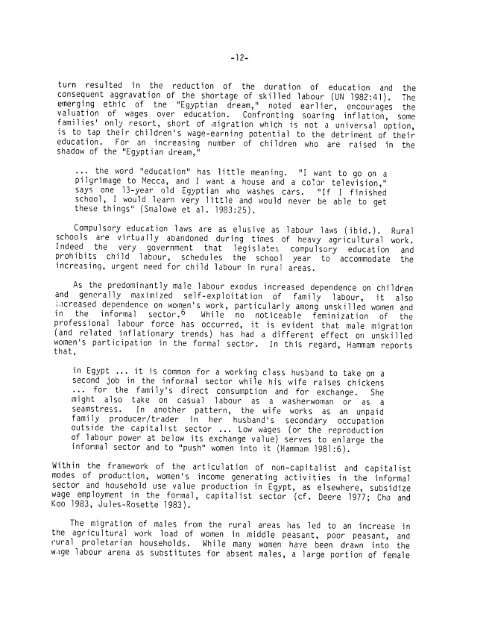FAMILIAL ADAPTATIONS TO THE INTERNATIONALIZATION OF ...
FAMILIAL ADAPTATIONS TO THE INTERNATIONALIZATION OF ...
FAMILIAL ADAPTATIONS TO THE INTERNATIONALIZATION OF ...
You also want an ePaper? Increase the reach of your titles
YUMPU automatically turns print PDFs into web optimized ePapers that Google loves.
-12<br />
turn resulted in the reduction of the duration of education and the<br />
consequent aggravation of the shortage of skilled labour (UN 1982:41). The<br />
emerging ethic of tne "Egyptian dream," noted earlier, encourages the<br />
valuation of wages over education. Confronting soaring inflation, some<br />
families' only resort, short of migration which is not a universal option,<br />
is to tap their children's wage-earning potential to the detriment of their<br />
education. For an increasing number of children who are raised in the<br />
shadow of the "Egyptian dream,"<br />
... the word "education" has little meaning. "I want to go on a<br />
pilgrimage to Mecca, and I want a house and a color television,"<br />
says one 13-year old Egyptian who washes cars. "If I finished<br />
school, I would learn very little and would never be able to get<br />
these things" (Smalowe et al. 1983:25).<br />
Compulsory education laws are as elusive as labour laws (ibid.). Rural<br />
schools are virtually abandoned during times of heavy agricultural work.<br />
Indeed the very government that legislates compulsory education and<br />
prohibits child labour, schedules the school year to accommodate the<br />
increasing, urgent need for child labour in rural areas.<br />
As the predominantly male labour exodus increased dependence on children<br />
and generally maximized self-exploitation of family labour, it also<br />
icreased dependence on women's work, particularly among unskilled women and<br />
in the informal sector. 6 While no noticeable feminization of the<br />
professional labour force has occurred, it is evident that male migration<br />
(and related inflationary trends) has had a different effect on unskilled<br />
women's participation in the formal sector. In this regard, Hammam reports<br />
that,<br />
in Egypt ... it is common for a working class husband to take on a<br />
second job in the informal sector while his wife raises chickens<br />
... for the family's direct consumption and for exchange. She<br />
might also take on casual labour as a washerwoman or as a<br />
seamstress. In another pattern, the wife works as an unpaid<br />
family producer/trader in her husband's secondary occupation<br />
outside the capitalist sector ... Low wages (or the reproduction<br />
of labour power at below its exchange value) serves to enlarge the<br />
informal sector and to "push" women into it (Hammam 1981:6).<br />
Within the framework of the articulation of non-capitalist and capitalist<br />
modes of production, women's income generating activities in the informal<br />
sector and household use value production in Egypt, as elsewhere, subsidize<br />
wage employment in the formal, capitalist sector (cf. Deere 1977; Cho and<br />
Koo 1983, Jules-Rosette 1983).<br />
The migration of males from the rural areas has led to an increase in<br />
the agricultural work load of women in middle peasant, poor peasant, and<br />
rural proletarian households. While many women have been drawn into the<br />
wige labour arena as substitutes for absent males, a large portion of female
















